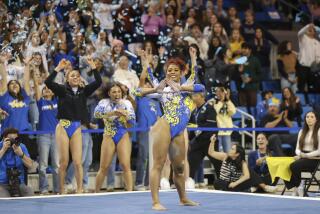Teen Scores a Perfect 10 (Times 240)
There’s nothing like a morning bout with advanced calculus to get Yuliya Rebrova’s brain going.
It was first period on a recent Friday, and the 16-year-old Taft High School senior was deftly deriving the slope of a tangent line.
“Two sine over cosine,” she mumbled, “pi over three....”
She sighed. Scribbled. Stopped.
“Wait,” she said. “What’s one-quarter minus one-half?”
She quickly answered her own question: “Negative one-fourth.”
A few more scrawls and Julia (as she’s called) had her answer.
“The slope,” she said plainly, “is the negative square root of three.”
Done.
“All right, that was easy,” she sighed, slapping her calculus book shut.
Julia had knocked out a three-day weekend’s worth of calculus homework in a matter of minutes. She didn’t even double-check the answers in the back of the book.
“I like having math this early,” she said between bites of a cinnamon bagel. “It wakes me up, makes me think.”
Even college entrance exams were no match for Julia. She earned perfect scores on the Scholastic Achievement Test and the American College Test -- 2400 and 36, respectively -- without a guess. She hadn’t even cracked open an SAT prep book until a week before last spring’s exam.
The Los Angeles Board of Education recently called on Julia to provide a “moment of inspiration” before members tackled their regular business. She rattled off her achievements: high test scores, advanced courses and her applications to some of the top colleges in the country.
“I just don’t get it,” said Dean Schaffer, 17, captain of Taft’s academic decathlon squad. “We put all this effort into the decathlon, and you do well on that, but you didn’t put any effort into the SAT and ACT, and you aced that too.”
Only .01% of the nation’s high school students who took the ACT last year earned perfect scores. Similarly, fewer than 1% got every answer correct on the SAT. To beat them both is practically unheard of, according to the College Board, which administers the college entrance tests.
“I studied, but it wasn’t a copious amount of studying,” Julia said, unconsciously slipping an SAT word into her casual conversation.
There was a time when Julia didn’t know any English.
She and her family moved from Moscow in 1994, when she was 4. Julia, who has a younger sister, has excelled through the Los Angeles Unified School District, even skipping fourth grade.
She’s trilingual now, proficient in Russian, English and Spanish.
Julia dominated her world history class, regularly belting out answers to classroom versions of “Jeopardy!,” said Sherie Stephens, who taught Julia in ninth grade and this year.
“Everybody hated her because she would always answer all the questions,” Stephens said. “I had to make up a rule saying you’re not allowed to answer two questions in a row.”
Not that the braininess goes to Julia’s head.
“She knows she’s smart, but she’s not a smart-aleck,” Stephens said. “A lot of the AP kids can be very ornery, always fighting for grades. But she never did that.”
If anything, say her friends and teachers, Julia has a low tolerance for immaturity.
Her third-period Advanced Placement environmental science class -- right at the hump of the day -- is the one she dreads most.
She sat by herself in the back of the dark classroom recently as the teacher, Tana Starr, gave a PowerPoint presentation on the dangers of indoor and outdoor air pollution.
“I don’t get it,” said one of the students, trying to find a way to avoid the harmful air. “Can’t you just go in your room and close the door?”
Julia rolled her pale blue eyes and plopped her head down on her desk.
While students giggled and gossiped during the first part of class, Julia devoured the latest Popular Science magazine. She tucked her wavy, sandy-colored hair behind her ears, crossed her left leg over her right knee and let her Converse kick wildly in the air as she flipped the pages.
Julia likes to “discuss things over coffee,” including government, politics and the economy. She listens to classical music and let a friend borrow a Mozart CD.
Not that the teenager doesn’t know how to have fun. She sported melon-painted fingernails that went with a dress she wore to a decathlon banquet. And, before she joined the decathlon, she used to compete with the school’s swim team.
But those were the old days. Today, Julia said, “I’m a better decathlete than I am an athlete, that’s for sure.”
She trains relentlessly.
The nine-member team, which will compete in an academic marathon next month, doesn’t usually leave campus until 9 or 10 p.m. and returns on weekends.
“I really believe in what I’m doing,” Julia said, “so I’m OK with sacrificing things.”
Some of those sacrifices include her other, mostly older, friends.
“She’s too busy to hang out this year,” said her best friend, Anya Newman, 18, who calls her “Jules” and remembers the sleepovers, Harry Potter parties and freshman dance class they shared.
“Occasionally, I catch her online.”
There’s a lot riding on the decathlon. The school’s rival, El Camino Real, beat Taft and became the 2005 national champion.
This year’s team has been studying since last summer.
The nine have become so deeply enmeshed in such subjects as history, science and literature that many students are cruising through their regular classes, said decathlon coach Arthur Berchin. Six of the decathletes said they earned the perfect 800 on the math portion of the SAT.
At a practice on a Friday afternoon, Julia and her teammates worked out the left sides of their brains through a timed math drill.
For 25 minutes, she silently scribbled, sometimes shaking her head and chuckling as she tried to answer the questions.
She guessed on three. She was wrong on one.
But she still managed to do better than her teammates. She scored 971 out of a possible 1,000 points.
The others ranged from the mid-400s to the 800s.
For now, this is Julia’s life: testing, training to become the best decathlete she can. Everything else -- preparing for prom and graduation, going to movies and sleepovers -- must wait.
She’s still waiting to hear from some of the many schools to which she applied -- all the UCs, Massachusetts Institute of Technology, Penn State, Stanford, Yale.
Julia isn’t sure what she wants to study when she gets to college. Maybe law, maybe business.
For once, she sounds like a typical senior.
“I just have the vaguest of ideas,” Julia shrugged. “I guess that’s what four years of college is for.”
More to Read
Sign up for Essential California
The most important California stories and recommendations in your inbox every morning.
You may occasionally receive promotional content from the Los Angeles Times.










